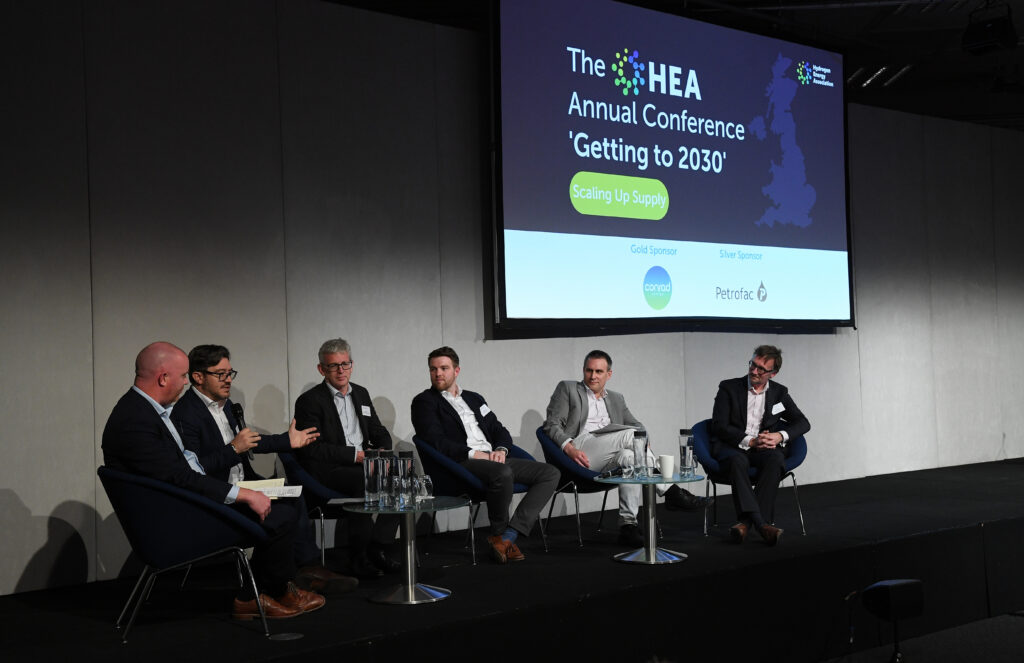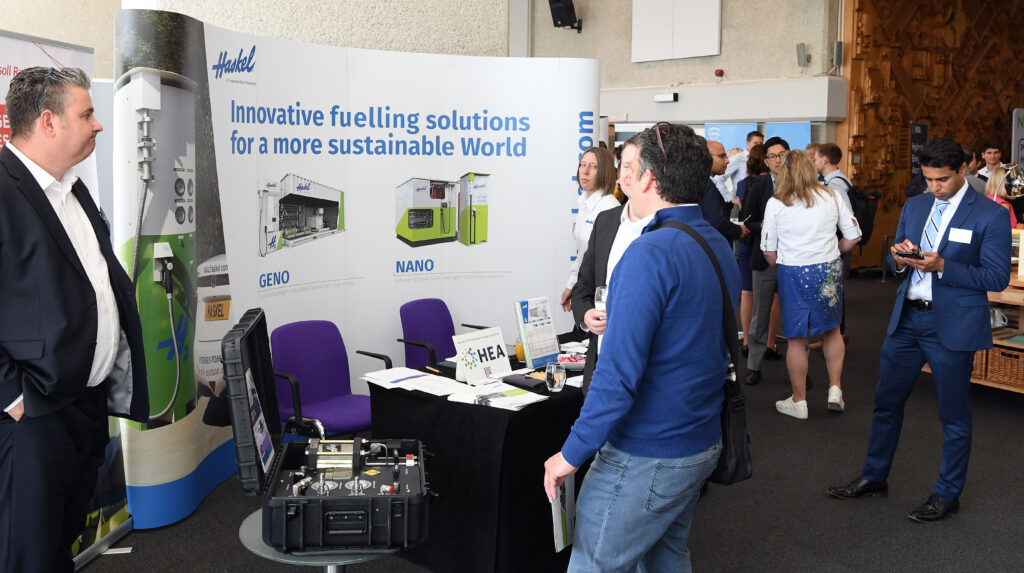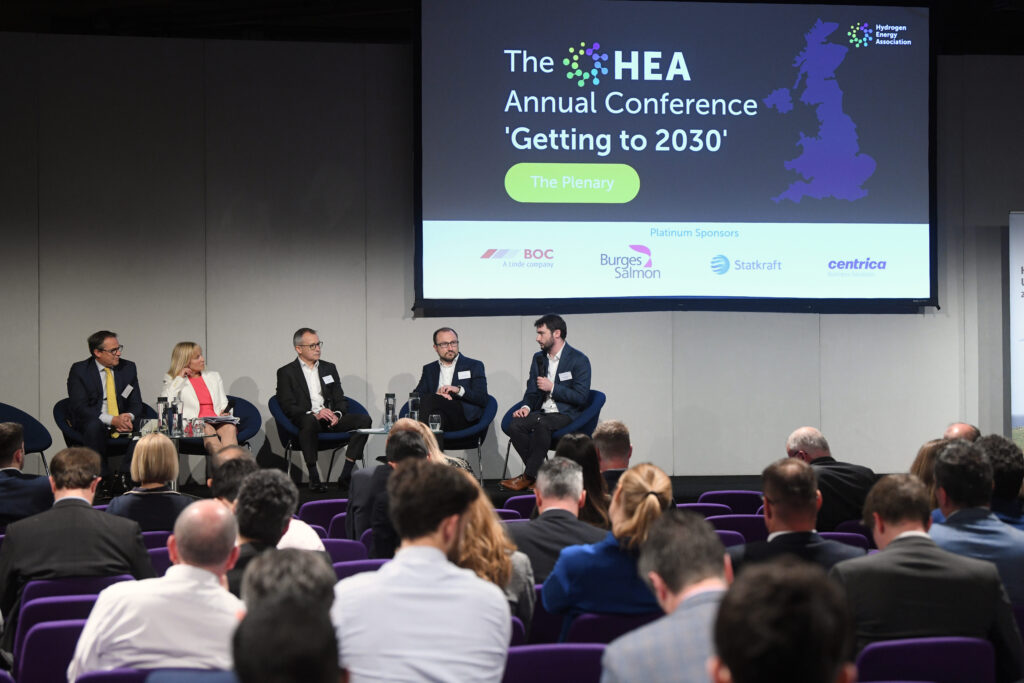Low carbon hydrogen will be vital to the UK’s energy transition, providing enhanced resilience and clean growth, as well as forming a key element of our net zero ambitions.
Its importance has become increasingly clear over the past few months of energy supply upheaval and wider geopolitical developments, so our 2023 conference was the ideal opportunity to bring together representatives from the entire hydrogen value chain to focus on the UK hydrogen journey to 2030 and the achievement of the UK’s target of 10GW low carbon hydrogen capacity by that date.
The agenda was full of opportunities to learn and share best practice and knowledge, kicking off with the unveiling of our new brand, renaming the longest running pan association in the sector – the UK Hydrogen and Fuel Cell Association – and repositioning ourselves as the Hydrogen Energy Association to better reflect the depth and breadth of our membership and the full scope of our activities.

We were thrilled to introduce Lord Dominic Johnson, Minister for Exports and Finance, who talked earnestly about his support for the sector and government commitments to continue to work with delegates to reach Net Zero goals.
Our platinum sponsors and contributors BOC, Burges Salmon, Statkraft and Centrica Business Solutions were all represented in our plenary session with Mícheál Ó Broin from Statkraft eloquently outlining the desire in the industry to improve opportunities for new talent.
He said: “We need to increase the skilled workforce in our industry and ensure we continue to attract a diverse range of applicants if we are going to meet the UK’s hydrogen target.”
Our Chair, Amanda Lyne, was then joined in discussion by Chris Stark, CEO, Committee on Climate Change who looked further ahead at the ambitions for the sector, encouraging us all to look well beyond 2035.
He said: “The use of hydrogen in the power system isn’t getting enough attention in the model for 2035. We need to be more serious about where we are using hydrogen and rolling forward to 2050 when we can produce more green. That’s the journey.
“There’s a welcome focus right now on how we produce and generate hydrogen, but we think government plans are at the lower end of what we need.
“We need to look at the target we have for 2050 and find the quickest way to get there right now.”
This sense of urgency was echoed in the Scaling Up Supply session chaired by Neil Golding, Director of Market Intelligence at the EIC, who was joined by contributors including Neil Filkin, Conrad Energy.
Neil perfectly misquoted the famous JFK speech on space exploration saying: “We choose to push forward our work in hydrogen, not because it is easy but because it is hard, because it will serve to organise and measure the best of our energies and skills, because that challenge is one that we are willing to accept, one we are unwilling to postpone and one we intend to win.”

Lunch provided a welcome break for networking before we were invited to ask questions of the Building Demand group chaired by Nigel Holmes, CEO of Scottish Hydrogen and Fuel Cell Association.
Contributor Jake Martin of Ingersoll Rand continued Neil’s theme and said: “As a collective we are now looking at ways for hydrogen to make more ‘impossibles’ possible. We are at the probable stage – but we are well on the way to the moon with potential.”
David Hurren, President from BCGA chaired the Growing Supply Chains panel that included Darrell Jones, Northern Valve & Fitting Company Limited, Sam French, Johnson Matthey, Nicola Thomas, National Gas, Leon Prebeau-Menezes, Equinor and Wayne Thornhill, Ames Goldsmith.
Sam said: “The UK Hydrogen Strategy was leading the way, but I think we have been caught up if not overtaken, by other countries.
“Maybe we are not telling the story well enough. If we want to lead and, I think we can, we don’t want to be importing from elsewhere, we have to decide where on the supply chain we want to focus.”
This was followed by Oiling the Wheels chaired by James Earl, Director of Gas at Energy Networks Association.
This panel considered some of the wider developments that will shape the hydrogen sector, such as public and private sector finance.
A closing keynote speech was delivered by Will Lochhead, Deputy Director and Head of Hydrogen Production, Storage and Industrial Carbon Capture Business Models at the Department for Business, Energy & Industrial Strategy, followed by a drinks reception.
With hundreds of delegates, it’s fair to say the event, at the prestigious QE2 centre opposite Westminster, gave us a superb opportunity to engage with the political and policy making communities and create a real agenda for to year ahead.
We eagerly look forward to hosting our members and representatives from across the hydrogen sector next year. Save May 23, 2024, in your diary now!
